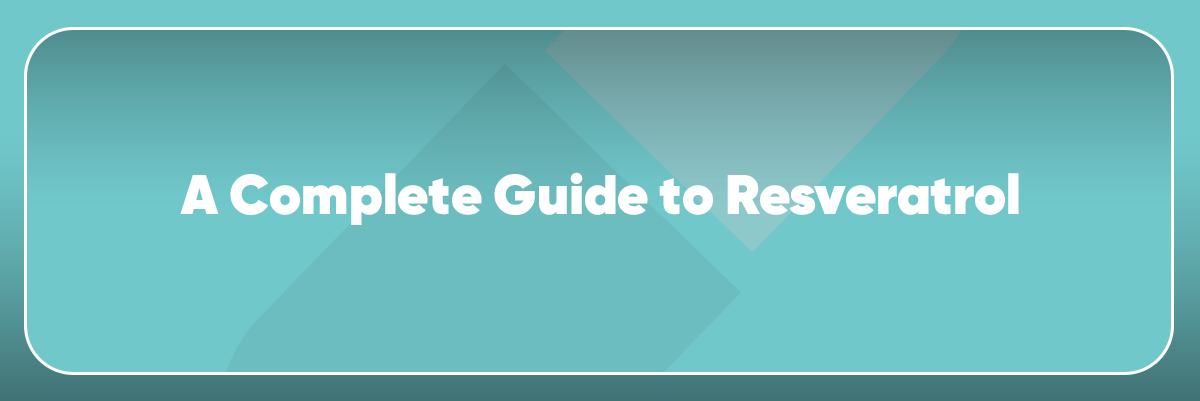You may have heard the popular claim that certain indulgent food and drinks like wine and chocolate are somewhat good for you, but may not have heard why. The natural compound in these two examples is called resveratrol, and researchers have recently been studying its promising health benefits.
Resveratrol’s health benefits were first highlighted in the early 1990s in the French Paradox study, observing why French adults have a lower incidence of coronary heart disease despite a high intake of cholesterol and saturated fat. Several studies have since found that resveratrol has exciting links to lowering blood pressure, lengthening lifespan, and inhibiting cancer cell growth. Hence why there is a lot of buzz around this compound.
In this article, we’ll explain what resveratrol is, and give an overview of its uses and benefits using research conducted on this compound.
What is Resveratrol?
Resveratrol is a natural compound found in certain foods, including grapes, berries and the roots of plants like Japanese knotweed. Resveratrol is part of a group of compounds called polyphenols, which are naturally occurring micronutrients found in plants.
Research has shown that polyphenols, such as resveratrol, act as effective antioxidants that have anti-inflammatory properties, protect against cancer cell growth, help to lower blood pressure, may increase lifespan and also inhibits yeast infections, and protect against neurodegenerative diseases (1).
Benefits of Resveratrol
The health benefits of this natural compound make it an exciting target for future drugs and treatments. Research has only been conducted using high concentrations of resveratrol supplements, as opposed to participants consuming resveratrol through food and drink.
1. Reduce Cancer Cell Growth
Research on resveratrol has shown that it can lower the risk of cancer by promoting apoptosis (programmed cell death) (2), which allows unhealthy cells to be removed from the body before they become cancerous.
A review of studies concludes that resveratrol could be a good prospect for treating and preventing fast-spreading cancer cells, such as those found in gastric cancer (3). A separate scientific paper also concluded that resveratrol had chemopreventive effects on the spread of cancer cells (4).
2. Lower Blood Pressure
A large study in 2015 showed that a daily dose of 150mg of resveratrol per day significantly reduced systolic blood pressure levels (5). Systolic blood pressure is the pressure created as blood is pushed through the body, which generally increases with age.
A more recent review in 2019 also confirmed that resveratrol is effective at reducing blood pressure and promoting cardiovascular health at doses of more than 300mg per day (6).
3. Neuroprotective Properties
Several studies have investigated how resveratrol may protect the brain from cognitive decline and disease. These studies recognise that resveratrol is a well-recognized antioxidant, which can help regulate normal brain function.
Much of the research has centered around whether drinking moderate amounts of red wine, which contains resveratrol, will reduce the risk of dementia (7) (8).
A review of these studies concluded that resveratrol may be an effective supplement to combat age-related neurodegenerative diseases like dementia and Alzheimers (9).
4. Lengthen Lifespan
A lot of research has focused on how resveratrol appears to have the ability to increase lifespan by counteracting the symptoms of age-related disease (10). Many of these studies have focused on how resveratrol activates key genes and pathways that are responsible for controlling lifespan (11).
Research has shown that calorie restriction has been closely linked with anti-aging effects (12), and separate studies have found that supplementing certain compounds like resveratrol can have the same beneficial effect (13).
Overall, a review of the studies linking resveratrol and lifespan showed that resveratrol supplementation prolonged lifespan in around 60% of the cases (14). The review concludes that a variety of factors such as dose, gender, genetic background, and diet may also contribute to the observed effects of prolonged lifespan.
5. Reduce Inflammation
A review of studies investigating the link between resveratrol and joint health concludes that there is credible evidence that resveratrol has anti-inflammatory effects (15).
A study on the effects of resveratrol in inflammatory arthritis showed that resveratrol may protect cartilage against the development of arthritis (16).
Research on using resveratrol as a treatment for chronic intestinal inflammation showed that it significantly reduced the clinical signs of the disease (17).
What are the side effects of Resveratrol?
Resveratrol has been widely studied and has been noted studied for its apparent lack of toxicity (18). Though fewer studies have specifically looked at the side effects of resveratrol, the consensus is that like most supplements, adverse effects only occur from high doses (19).
Side effects from extremely high doses of resveratrol (2-5 grams per day) have led to episodes of light and mild diarrhoea, nausea, and hypersensitivity (19). The evidence shows that adverse reactions in doses of less than 1,000 mg per day are scarce.
Who should not take Resveratrol?
If you are pregnant or breastfeeding, it's best to avoid resveratrol altogether. Resveratrol has been seen to influence levels of estrogen in the body and may cause complications for pregnant women and those breastfeeding.
Recommended Dosage
Most studies on resveratrol have seen beneficial effects from doses between 250-500 milligrams per day.
It would be nearly impossible to benefit from the effects of resveratrol through your diet alone; research has shown that food and drink sources do not contain enough of the compound for it to provide any of the health benefits. You would need to take a resveratrol supplement in order to gain the benefits.
You can read more about food sources high in resveratrol and how much you’d need to consume.
Another important thing to note about resveratrol is that not all supplements are created equally. In order to get the most out of this compound, it's best to look for a supplement that has a high concentration of pure trans-resveratrol.
When should I take resveratrol morning or night?
A study has shown that bioavailability (that amount of a substance that is able to access circulation) was higher after taking resveratrol in the morning (20). So we recommend taking resveratrol supplements in the morning.
FAQs
Does resveratrol increase estrogen??
The research concludes that resveratrol is a phytoestrogen: a substance that can produce estrogen-like effects. However, the research also shows that resveratrol may boost the activity of estrogen, and in other times block estrogen (21).
Does resveratrol increase testosterone?
A study found that 50mg of resveratrol per day increased blood testosterone concentration by 51%, sperm counts by 15%, and sperm motility by 23% (22).
Does resveratrol help you sleep?
One study has shown that resveratrol may be able to regulate sleep-wake rhythms (23).
How can I get resveratrol naturally?
Resveratrol is present in lots of commonly consumed food and drinks, such as grapes, wine, peanuts, blueberries, cocoa, and several other berries. However, it isn’t likely that you’ll be able to get the benefit from the effects of resveratrol through your diet alone.





Leave a comment
All comments are moderated before being published.
This site is protected by hCaptcha and the hCaptcha Privacy Policy and Terms of Service apply.